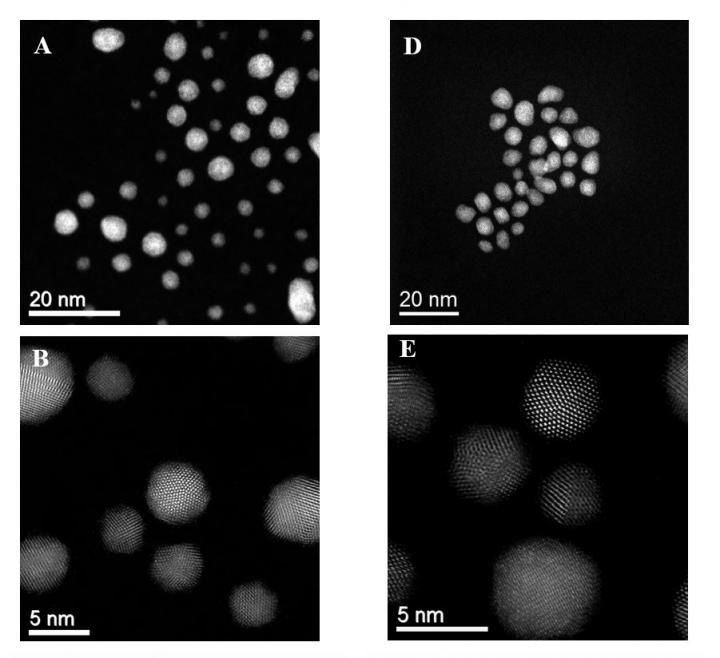Sep 8 2017
A team of Researchers from Lehigh and Cardiff University have shown a potential approach where colloidal gold-palladium nanoparticles were used to directly oxidize methane to methanol with high selectivity in aqueous solution at mild temperatures.
 High-angle annular dark-field imaging (HAADF) and Lehigh’s aberration-corrected scanning transmission electron microscope enabled the researchers to characterize the Au-Pd catalyst before (A and B) and after (D and E) a CH4 oxidation reaction. (Image courtesy of Christopher Kiely and Graham Hutchings)
High-angle annular dark-field imaging (HAADF) and Lehigh’s aberration-corrected scanning transmission electron microscope enabled the researchers to characterize the Au-Pd catalyst before (A and B) and after (D and E) a CH4 oxidation reaction. (Image courtesy of Christopher Kiely and Graham Hutchings)
Liquid methanol is extensively used as a feedstock for other chemicals and also has substantial potential as an alternative fuel source. However, changing methane — the main component of abundant natural gas — into methanol is presently accomplished by an indirect process which requires high pressure and heat.
Now Researchers have developed a new method that permits the direct conversion of methane to methanol using molecular oxygen under much milder reaction conditions.
A research team headed by Graham J. Hutchings at the Cardiff Catalysis Institute, and Christopher J. Kiely at Lehigh, made use of colloidal gold-palladium (Au-Pd) nanoparticles to directly oxidize methane to methanol with high selectivity in aqueous solution at low temperatures. Their findings have been published in a Science article titled “Aqueous Au-Pd colloids catalyze selective CH4 oxidation to CH3OH with O2 under mild conditions.”
Our work has shown that if a stable supply of methyl radicals can be established—for example, by incorporating a very small amount of hydrogen peroxide into the reaction mixture—then the selective oxidation of methane to methanol using molecular oxygen is entirely feasible.
Christopher J. Kiely, the Harold B. Chambers Senior Professor of Materials Science and Chemical Engineering
This most recent discovery has been guided by Kiely’s and Hutchings’ longtime collaboration on creating Au-Pd nanoparticles as effective catalysts for numerous other reactions.
According to Kiely, the Researchers were astonished to find that for this specific reaction to continue they required the Au-Pd nanoparticles to exist as free-floating colloids in a highly weak hydrogen peroxide solution into which they injected pressurized oxygen and methane gas.
“Usually when we use Au-Pd nanoparticles as catalysts they are nearly always dispersed on high surface area oxide supports such as titania,” said Kiely, who directs Lehigh’s Electron Microscopy and Nanofabrication Facility.
In this case however, the presence of the ceramic support turned out to be highly detrimental.
Christopher J. Kiely, the Harold B. Chambers Senior Professor of Materials Science and Chemical Engineering
In the chemical sector, methane is at present converted indirectly to methanol via the creation of synthesis gas (hydrogen and carbon monoxide) at high pressures and temperatures, which is a costly and energy intensive process. The highly promising candidate processes discovered so far for the direct conversion of methane to methanol are inclined to be inefficient, complex, and frequently requiring very high temperatures and aggressive reaction environments.
“The new simplified approach we have demonstrated brings us a step closer to making the direct conversion of methane to methanol a practically viable proposition,” said Kiely.
This research paper is the 10th Kiely has published so far in Science; he has also published four in Nature. The two publications are considered the leading science journals in the world.